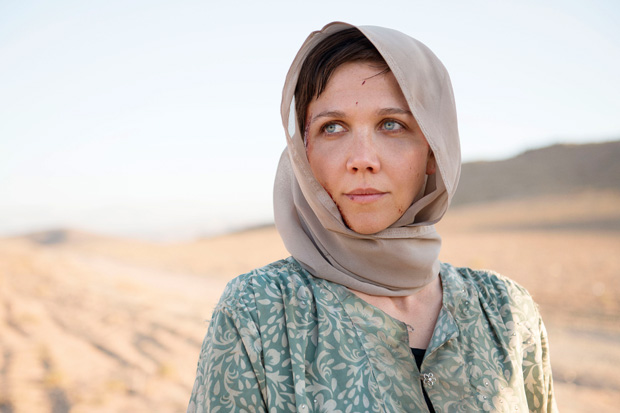BBC2’s The Honourable Woman (Thursday) began with a rather portentous voice-over bringing us the unsurprising news that ‘We all have secrets. We all tell lies just to keep them from each other and …pause to indicate psychological profundity …from ourselves.’ Luckily for the viewer, this was accompanied by the sight of man in a restaurant being stabbed to death by a waiter in front of his young son and daughter.
As it turned out, this would set the tone for much of what followed — an hour of drama that combined memorable set-pieces with slightly too transparent an insistence on its own significance. Meanwhile, we cut to 29 years later where the daughter Nessa’s blood-splattered dress had been replaced by robes of state, as she became Baroness Stein of Tilbury.
By then, Nessa (Maggie Gyllenhaal) had inherited her father’s business, although not his politics. Instead of providing Israel with arms, she was using the family money as part of her mission to bring peace to the Middle East by supplying the Palestinians with broadband and music scholarships. And if that sounds a bit ambitious, well so is the programme.

Hugo Blick, whose first big TV project this is since 2011’s The Shadow Line, seems to have pulled off the Stephen Poliakoff trick of being allowed to produce, write and direct more or less whatever he wants — in this case an eight-part series that promises to blend the personal with the geopolitical. In theory, all TV reviewers are in favour of giving creative talent this kind of freedom. In practice, Blick, like Poliakoff, could perhaps do with an overpaid executive in a suit occasionally telling him to rein in the theatricality of his dialogue, and the tendency to light and direct every scene to within an inch of its life. The same exec might even suggest that Blick could have more mercy on the audience — because the first episode trod a dangerous shadow line of its own: the one that separates the intriguing from the plain baffling.
In fact, having seen episode two, I can reassure any doubters that things do begin to fall into place next week. For now, though, Blick seemed almost heroically keen to warn off the casual viewer, and to make it clear that the secrets would be in no hurry to reveal themselves. Could the Palestinian businessman awarded Nessa’s latest contract really have committed suicide just before she announced it? Why is a posh spook called Sir Hugh Hayden-Hoyle (Stephen Rae) being eased out of his job — and why does he speak in that weirdly camp way, while seeking to convey any strong emotion by the simple act of removing his glasses? Come to that, is the saintly Nessa all she seems?
At the moment, about all that’s certain is that Maggie Gyllenhaal is riveting: not only giving TV viewers a rare chance to marvel at how well an American actor can do a British accent (rather than the other way round), but also doing a perfect job of suggesting the personal cost of Nessa’s apparent omnicompetence.
Otherwise, everything is still up for grabs, including whether the series will prove as historically good as it obviously intends to be. For what it’s worth, my guess is that it will continue to feel somewhat self-conscious in its commitment to being High-Class Television — but that it will also be high-class television.
Needless to say, it’s not unknown for TV presenters to fake a longstanding interest in whatever their programme happens to be about. There is, however, nothing fake in Rebels of Oz: Germaine, Clive, Barry and Bob (Tuesday), a new two-parter on BBC4. In his 1986 novel Redback, Howard Jacobson used his own experience of moving from Britain to Australia in the 1960s to raise the question of why some of Australia’s best minds had just headed in the opposite direction. Now, he returns to the subject with huge and infectious enthusiasm — and with the help of three of the minds in question: Clive James, Germaine Greer and Barry Humphries. (Bob, aka the late Robert Hughes, is represented by a healthy dollop of archive.)
Of course, the traditional answer as to why the four left Australia is that the place was a cultural desert. But, as Jacobson personally testified, no it wasn’t. He also made the irrefutable point that, if it had been, then ‘our famous four’ could never have had the confidence and all-round intellectual firepower to make such an impact on British life once they got here.
As well as reminding us of two vanished bohemian worlds, 11,000 miles apart, the programme confirmed what a great TV presenter Jacobson is. (If only he hadn’t got distracted writing all those books.) Here, he was as fluent as ever — ‘Bob wrote as he spoke: like an aristocrat who’s just stumbled out of a bar, but with his syntax intact.’ He also has the clout to pull in big names, with the likes of Simon Schama, Martin Amis and Eric Idle remembering the transforming effect of what Schama called these ‘hoodlums in the playground’, with their fearlessness and revelatory indifference to class.
As for the interviews with Clive, Barry and Germaine, virtually every sentence was a gem, including the parts where Jacobson mastered the difficult art of entirely convincing flattery. ‘You struck all of us as astonishing,’ he told a beaming Greer about meeting her in Cambridge. ‘We’d never met anyone like you. We’d never heard of anyone like you.’
In his interview with James, mind you, he qualified this verdict to ‘Germaine was terrifying.’ ‘She’s terrifying now,’ James replied. ‘And she was terrifying when we were in Australia.’






Comments